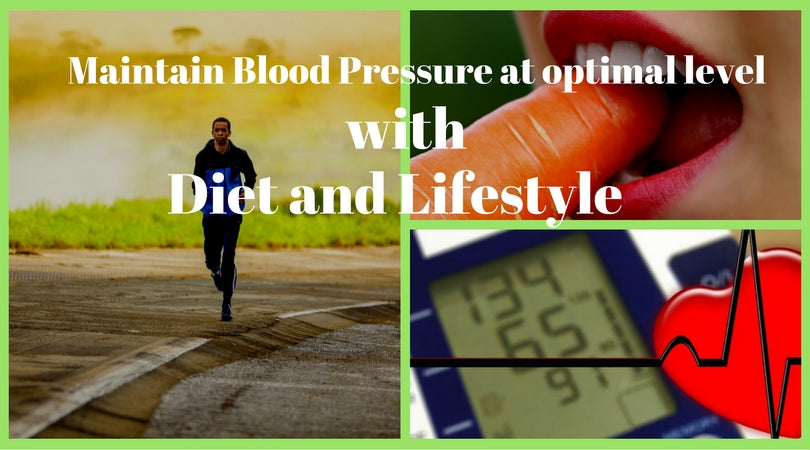
Maintain Blood Pressure at Optimal Level with Diet and Lifestyle
Share
Normal blood pressure is an indication of good health. If you maintain blood pressure in the normal range you will have less risk of heart disease and stroke.
Blood pressure of a healthy person is close to 120/80. If your blood pressure is within that range, it’s an indication that you are healthy, and you should try to keep it at that level. Blood pressure higher or lower than normal range is bad for your health. If you have higher blood pressure, for example 140/90, you should try to bring it down because higher blood pressure increases your risk of stroke or heart attack.
If your blood pressure is too low, it’s also bad for you. Lower blood pressure can prevent the right amount of blood from reaching your brain. It can cause you to feel weak, dizzy, and cause you to blackout.
You can keep your blood pressure under control simply by living a healthy lifestyle. Below we have 5 tips to help you maintain your optimal blood pressure.
 Losing extra pounds from your body may help you reduce your blood pressure. If you have excessive fat, your heart has to work harder to circulate blood. Losing weight will also boost your immune system and general health. Being overweight increases your risk of heart diseases and diabetes. Make sure you know your optimal weight and stick to it. To lose weight, exercise regularly, eat healthy, and live a healthy, disciplined life.
Losing extra pounds from your body may help you reduce your blood pressure. If you have excessive fat, your heart has to work harder to circulate blood. Losing weight will also boost your immune system and general health. Being overweight increases your risk of heart diseases and diabetes. Make sure you know your optimal weight and stick to it. To lose weight, exercise regularly, eat healthy, and live a healthy, disciplined life.
 If you are a smoker, try to cut back on cigarettes or quit. Cigarettes contain many harmful toxins including nicotine and carbon monoxide. Carbon monoxide replaces some oxygen in your blood, making it harder for your heart to work. Nicotine clogs up your arteries, and narrows down your blood vessels. As a result, your blood pressure increases and your heart muscles get weaker.
If you are a smoker, try to cut back on cigarettes or quit. Cigarettes contain many harmful toxins including nicotine and carbon monoxide. Carbon monoxide replaces some oxygen in your blood, making it harder for your heart to work. Nicotine clogs up your arteries, and narrows down your blood vessels. As a result, your blood pressure increases and your heart muscles get weaker.
5 Tips to Help you Maintain Your Optimal Blood Pressure
Here are 5 tips to help you maintain your optimal blood pressure without any drugs. However, we recommend that you consult your doctor if you are on medication or if you have existing heart conditions.1. Lose Weight:
 Losing extra pounds from your body may help you reduce your blood pressure. If you have excessive fat, your heart has to work harder to circulate blood. Losing weight will also boost your immune system and general health. Being overweight increases your risk of heart diseases and diabetes. Make sure you know your optimal weight and stick to it. To lose weight, exercise regularly, eat healthy, and live a healthy, disciplined life.
Losing extra pounds from your body may help you reduce your blood pressure. If you have excessive fat, your heart has to work harder to circulate blood. Losing weight will also boost your immune system and general health. Being overweight increases your risk of heart diseases and diabetes. Make sure you know your optimal weight and stick to it. To lose weight, exercise regularly, eat healthy, and live a healthy, disciplined life.
2. Exercise:
Working out regularly keeps you slim and also stimulates your body to produce nitric acid, which opens up blood vessels and lowers blood pressure. Cardio exercises also strengthen your heart muscles and reduce your risk of heart attack.3. Cut back on Salt:
You should consume no more than 2000 milligrams of salt per day. Carefully read food labels and choose your food wisely. Avoid food items that contain more than 250 milligrams of sodium per serving. Research shows that there is a correlation between sodium intake (found in table salt) and high blood pressure.4. Quit Smoking:
 If you are a smoker, try to cut back on cigarettes or quit. Cigarettes contain many harmful toxins including nicotine and carbon monoxide. Carbon monoxide replaces some oxygen in your blood, making it harder for your heart to work. Nicotine clogs up your arteries, and narrows down your blood vessels. As a result, your blood pressure increases and your heart muscles get weaker.
If you are a smoker, try to cut back on cigarettes or quit. Cigarettes contain many harmful toxins including nicotine and carbon monoxide. Carbon monoxide replaces some oxygen in your blood, making it harder for your heart to work. Nicotine clogs up your arteries, and narrows down your blood vessels. As a result, your blood pressure increases and your heart muscles get weaker.
